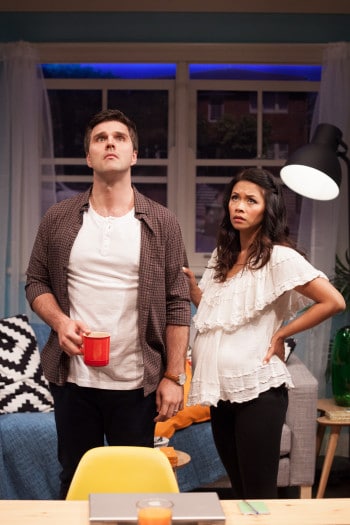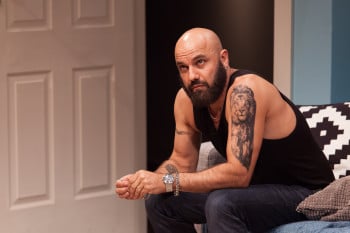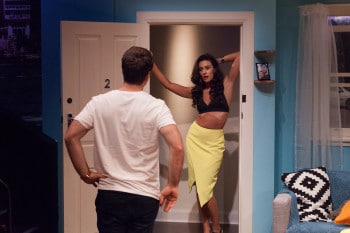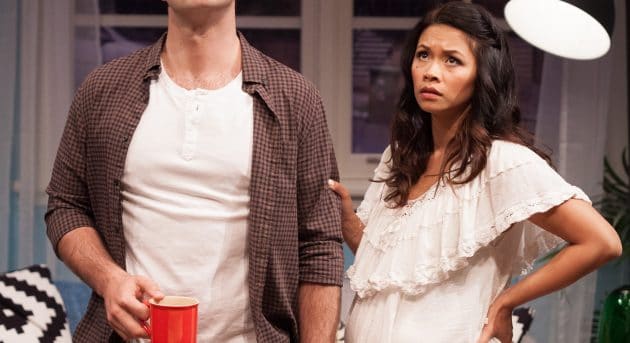Review: Dream Home, Ensemble Theatre
David Williamson’s Dream Home is a play about Paul, who moves into a new block of flats. When he arrives, all three women living there proceed to throw themselves at him in a variety of demeaning ways. He’s loyal to his pregnant wife, but it’s not like he can control his erections, and it’s not like any self-respecting woman could resist him.
Of course, this is not how David Williamson would describe the plot. He’d say it was a response to the pressures of the current housing market, a darkly comic look at the concept of a dream home not being all it’s cracked up to be.

Which is all fine and well, but in reality it’s about how Paul (Guy Edmonds) can’t stop attracting all these women who are varying degrees of pathetic, and who don’t seem to respect the fact that he’s married with a baby on the way. It’s about a creative professional (Paul writes film scores that sound like the opening theme of A Country Practice) who’s irresistible to women. He’s in over his head but the women just keep coming. What is he to do? It smacks of male wish-fulfilment and it smacks of sexism. An entire block of flats throws thsemelves at their new neighbour because he reminds them of Tom Cruise? Please.
“I’m a lucky woman,” Paul’s wife Dana (HaiHa Le) purrs, snuggling on a couch with Paul. “I bet that’s the first time a woman has said that to her husband since The Female Eunuch,” replies Paul, apparently wittily. The audience laughs.
Why are we even here? For a look at the middle-class struggle? Which clearly we don’t get enough of on stage (?!) For a production that plays off and up offensive stereotypes of a Lebanese neighbour? (It’s not a politically correct portrayal just because the character makes veiled references to the Cronulla riots). Justin Stewart Cotta, who plays the explosive Sam, does a fine job elevating his material into something compelling, but when his phallic Napoleon complex kicks in, he’s really fighting uphill against the writing. To his credit, he largely succeeds; he’s the most alive figure on stage.

He’s also extremely violent and there are constant references to both his own violent history and the way he employs friends and colleagues to inflict violence on others (great way to not subvert a stereotype); a real high point in the play is where a woman is encouraged to have his children and stay with him, despite his very real threat of violence. That’s after he and another character had an argument about making light of domestic violence, and how it comes about because women don’t watch their mouths anymore.
If that’s not your favourite stereotype, don’t worry, there are plenty more to choose from. The hapless-clueless fantasy-sports-playing impotent Henry (Alan Flower), the cougar Cynthia (Olivia Pigeot), the beautiful-and-careless ex-model Colette (Liby Munro), the old-lady-busybody Wilma (Katrina Foster). Most of the actors do more justice to their parts than the writing should really allow, but it’s hard not to cringe from the audience whenever another clunky cliché pops out of the dialogue and lands at our feet.
Edmonds and Le ground the play in a sense of easy, naturalistic performance, and the set (by Marissa Dale-Johnson) sets up a breezy, pretty, modern-feeling home, all blues and Ikea, but that naturalism is shattered by the first knock on their door. Or, possibly before that, with the ill-fitting costume baby bump Le is wearing.

Dream Home, which Williamson has also directed, doesn’t commit to being a farce and doesn’t go dark enough to be a dark comedy. It ends up being a limp, self-conscious foray into contemporary relationships, playing at edginess by mentioning sex, and bogged down in past conservatism by reinforcing gender stereotypes, especially the villainous sex-positive women and the innocent men whose lives they might just ruin.
The play will run and the Ensemble theatre audience demographic will probably love it, but it’s a lazy and offensive piece of theatre.



